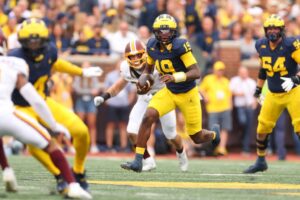Sportsbooks are obligated to pay taxes on their revenues to the state and local governments in which they operate. But one tax that has flown under the radar is the federal excise tax imposed on each wager, and several members of Congress are looking to eliminate it.
Scrap the Tax
A federal excise tax on sportsbooks dating back to the 1950s is under fire by U.S. Senators Catherine Cortez Masto, D-Nev., and Cindy Hyde-Smith, R-Miss., both of whom reintroduced the Withdrawing Arduous Gaming Excise Rates (WAGER) Act. Although the tax is only 0.25% on all wagers placed with regulated sportsbooks, it is just another competitive disadvantage those US sportsbooks are facing.
Senators Aim to Protect Sportsbooks
The duo has stated that eliminating the tax will “protect legal sportsbooks and gaming businesses” and “help states like Nevada and tribal communities reinvest their gaming revenues into their local economies.” The bill died during the 2024 session, only to be resurrected for this year’s upcoming session of Congress.
“It’s past time to exempt legal sports betting from outdated taxes that are actually incentivizing illegal sportsbooks,” Cortez Masto said in a news release. “This is bipartisan, commonsense legislation that will help boost local economies across the United States.”
Senator Hyde-Smith echoed her co-sponsor’s sentiments, saying, “Mississippi’s casinos and resorts play a key role in tourism, jobs, and community investment along our Gulf Coast. For too long, this outdated federal tax on sports betting has held this industry back, all while giving illegal offshore operators, and now new out-of-state-run prediction markets, an unfair edge against our more traditional casinos in Mississippi and elsewhere.”
Impact of the Excise Tax
Nationally, regulated sportsbooks have paid more than $500 million because of this excise tax since PASPA was repealed in 2018, paving the way for states to determine whether they would legalize sports betting.
It should be noted that this WAGER Act should not be confused with another bill of the same name sponsored by U.S. Representative Andy Barr of Kentucky, who sponsored his own WAGER Act, but this acronym stands for Winnings and Gains Expense Restoration.
Barr’s bill seeks to rescind the 90% deduction for gambling losses in President Trump’s One Big Beautiful Bill Act and reinstate the 100% deduction that has been in place for decades.
The GRIT Act
Although several lawmakers are seeking to repeal the federal excise tax on sportsbooks, others are finding unique ways to earmark the money. Representative Andrea Salinas of Oregon and Sen. Richard Blumenthal of Connecticut reintroduced the GRIT Act, which stands for the Gambling Addiction Recovery, Investment, and Treatment Act.
According to the GRIT Act, the funds derived from the federal excise tax on sportsbooks would be allocated specifically for the treatment, study, and prevention of gambling addiction.
“The growing legalization of sports betting, coupled with the ability to place bets from your phone whenever you want, has created the perfect storm for gambling addiction — resulting in a severe public health crisis,” Blumenthal said in a release. “The GRIT Act will allocate dedicated federal funding to tackle problem gambling head-on, allowing individuals suffering from gambling addiction to access support, resources, and treatment. With this legislation, we work to stop addiction and save lives.”




















